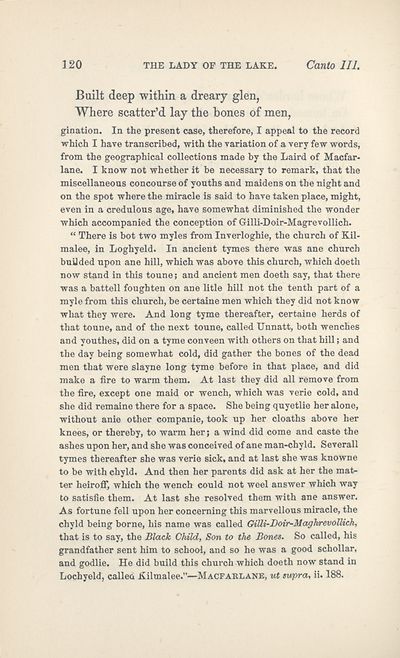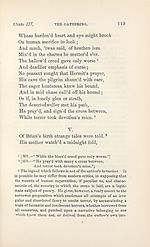Poetry > Lady of the lake
(134)
Download files
Complete book:
Individual page:
Thumbnail gallery: Grid view | List view

] 20
THE LADY OF THE LAKE.
Canto III.
Built deep within a dreary glen,
Where scatter’d lay the bones of men,
gination. In the present case, therefore, I appeal to the record
which I have transcribed, with the variation of a very few words,
from the geographical collections made by the Laird of Macfar-
lane. I know not whether it be necessary to remark, that the
miscellaneous concourse of youths and maidens on the night and
on the spot where the miracle is said to have taken place, might,
even in a credulous age, have somewhat diminished the wonder
which accompanied the conception of Gilli-Doir-Magrevollich.
“ There is hot two myles from Inverloghie, the church of Kil-
malee, in Loghyeld. In ancient tymes there was ane church
buijded upon ane hill, which was above this church, which doeth
now stand in this toune; and ancient men doeth say, that there
was a battell foughten on ane litle hill not the tenth part of a
myle from this church, be certaine men which they did not know
what they were. And long tyme thereafter, certaine herds of
that toune, and of the next toune, called Unnatt, both wenches
and youthes, did on a tyme conveen with others on that hill; and
the day being somewhat cold, did gather the bones of the dead
men that were slayne long tyme before in that place, and did
make a fire to warm them. At last they did all remove from
the fire, except one maid or wench, which was verie cold, and
she did remaine there for a space. She being quyetlie her alone,
without anie other companie, took up her cloaths above her
knees, or thereby, to warm her; a wind did come and caste the
ashes upon her, and she was conceived of ane man-chyld. Severall
tymes thereafter she was verie sick, and at last she was knowne
to be with chyld. And then her parents did ask at her the mat¬
ter heiroflf, which the wench could not weel answer which way
to satisfie them. At last she resolved them with ane answer.
As fortune fell upon her concerning this marvellous miracle, the
chyld being borne, his name was called Gilli-Doir-Maghrevollich,
that is to say, the Black Child, Son to the Bones. So called, his
grandfather sent him to school, and so he was a good schollar,
and godlie. He did build this church which doeth now stand in
Lochyeld, called Kilmalee."—Macfaklane, ut supra, ii. 188.
THE LADY OF THE LAKE.
Canto III.
Built deep within a dreary glen,
Where scatter’d lay the bones of men,
gination. In the present case, therefore, I appeal to the record
which I have transcribed, with the variation of a very few words,
from the geographical collections made by the Laird of Macfar-
lane. I know not whether it be necessary to remark, that the
miscellaneous concourse of youths and maidens on the night and
on the spot where the miracle is said to have taken place, might,
even in a credulous age, have somewhat diminished the wonder
which accompanied the conception of Gilli-Doir-Magrevollich.
“ There is hot two myles from Inverloghie, the church of Kil-
malee, in Loghyeld. In ancient tymes there was ane church
buijded upon ane hill, which was above this church, which doeth
now stand in this toune; and ancient men doeth say, that there
was a battell foughten on ane litle hill not the tenth part of a
myle from this church, be certaine men which they did not know
what they were. And long tyme thereafter, certaine herds of
that toune, and of the next toune, called Unnatt, both wenches
and youthes, did on a tyme conveen with others on that hill; and
the day being somewhat cold, did gather the bones of the dead
men that were slayne long tyme before in that place, and did
make a fire to warm them. At last they did all remove from
the fire, except one maid or wench, which was verie cold, and
she did remaine there for a space. She being quyetlie her alone,
without anie other companie, took up her cloaths above her
knees, or thereby, to warm her; a wind did come and caste the
ashes upon her, and she was conceived of ane man-chyld. Severall
tymes thereafter she was verie sick, and at last she was knowne
to be with chyld. And then her parents did ask at her the mat¬
ter heiroflf, which the wench could not weel answer which way
to satisfie them. At last she resolved them with ane answer.
As fortune fell upon her concerning this marvellous miracle, the
chyld being borne, his name was called Gilli-Doir-Maghrevollich,
that is to say, the Black Child, Son to the Bones. So called, his
grandfather sent him to school, and so he was a good schollar,
and godlie. He did build this church which doeth now stand in
Lochyeld, called Kilmalee."—Macfaklane, ut supra, ii. 188.
Set display mode to:
![]() Universal Viewer |
Universal Viewer | ![]() Mirador |
Large image | Transcription
Mirador |
Large image | Transcription
| Antiquarian books of Scotland > Poetry > Lady of the lake > (134) |
|---|
| Permanent URL | https://digital.nls.uk/109508522 |
|---|
| Description | Thousands of printed books from the Antiquarian Books of Scotland collection which dates from 1641 to the 1980s. The collection consists of 14,800 books which were published in Scotland or have a Scottish connection, e.g. through the author, printer or owner. Subjects covered include sport, education, diseases, adventure, occupations, Jacobites, politics and religion. Among the 29 languages represented are English, Gaelic, Italian, French, Russian and Swedish. |
|---|

